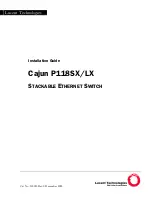
Page
53
File Transfer Protocol enables you to transfer files in a bi-directional method over a TCP/IP
network.
‧
Firewall
It is a mechanism that protects a network from attacks from the other networks. Also, it can
provide the Internet access control list that restricts clients’ connection to other networks.
‧
Firmware
It is programming that is inserted into programmable read-only memory and becomes a
permanent part of a computing or network device.
‧
Gateway
It is a device that connects the networks.
‧
Hardware
It is the physical part of computers and network device.
‧
H.323
It is an ITU (International Telecommunication Union) standard that describes how audio and
visual conferencing data is transmitted via a real-time and bi-directional method across the
network.
‧
HTTP
(
H
yper
T
ext
T
ransport
P
rotocol)
(
WEB
)
It is the protocol used to transmit and receive data over the World Wide Web. It can establish
connection with a Web server and transmit HTML pages to the client browser. For instance,
when you enter a domain name on your browser, you are actually sending an HTTP request to
a Web server for Web page information. After the Web server receives your HTTP request, it
will send the Web page to you by displaying it via the browser.
‧
Hub
A hub connects computing devices to host computers and allows a large number of devices to
share the Internet bandwidth.
‧
ICMP
(
I
nternet
C
ontrol
M
essage
P
rotocol)
It is a kind of TCP/IP protocol that sends the error message, the control message, and the
information messages to a network device. For instance, a router uses ICMP to notify the
sender that its destination node is not available. A ping utility can send ICMP echo request to
verify the existence of an IP address, too.
‧
ICQ
It is Internet message exchange software that enables you to have real-time chat with another
user installed the software.
‧
Infrastructure
Mode
It is a Wireless LAN topology that connects the wireless and wired LAN. It expands the
coverage of the wired LAN by creating radio communication between the Access Point and
wireless clients.
‧
IP
(
I
nternet
P
rotocol)
It is the Network Layer protocol in the TCP/IP communication and provides the basic packet
delivery for TCP/IP networks. It contains a network address and allows messages to be routed




































